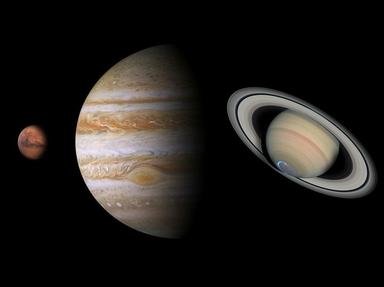Quiz Answer Key and Fun Facts
1. Venus is often called the Earth's "sister planet". Why is this?
2. Why can rovers not be sent to the surface of Venus?
3. Despite being farther from the Sun than Mercury, Venus has a hotter surface temperature.
4. What are Venus's clouds mostly made of?
5. The prime meridian of Venus passes through what distinguishing surface feature?
6. Approximately how many centimeters of (not necessarily water) rain hit Venus's surface each year?
7. About how old, on average, is the crust on Venus thought to be?
8. What is strange about Venus's magnetosphere?
9. What do Venus and Earth's moon have in common?
10. How did Venus help assert that the Earth was not the center of the Solar System?
Source: Author
jonthomas
This quiz was reviewed by FunTrivia editor
WesleyCrusher before going online.
Any errors found in FunTrivia content are routinely corrected through our feedback system.

